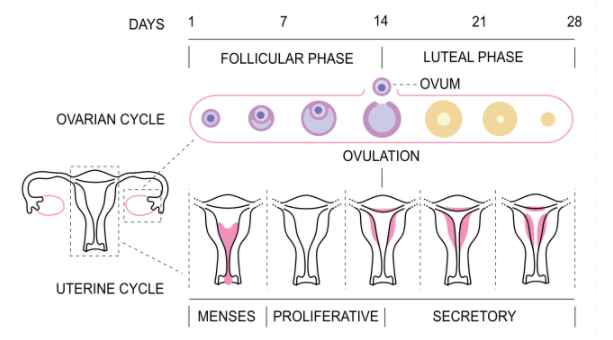
Corpus luteum gets converted into corpus albicans in absence of fertilization. Give reason.
Answer
590.7k+ views
Hint: Fertilization is the fusion of gametes to give rise to a new individual organism or offspring and initiate its development. The cycle of fertilization and development of new individuals is called sexual reproduction.
If the egg gets fertilized then the development of embryo starts but if egg is not fertilized, corpus luteum gets converted into corpus albicans which further gets degenerated.
Complete answer:
- A corpus luteum is a mass of cells that forms in an ovary and is responsible for the production of the hormone progesterone during early pregnancy.
- Menstrual cycle is a cycle of events in which the entire reproductive system of female undergo changes for preparing uterus for formation of gametes and for implantation.
- There are few phases in the menstrual cycle. From which one is luteal phase and in this phase body prepares for implantation if the egg is fertilized.
- The role of corpus luteum depends on whether fertilization has occurred or not.
- If there is no fertilized egg to implant in the thickened uterus lining, the corpus luteum degenerates in 10-12 days after ovulation and is transformed into a white scar called corpus albicans.
- Formation of corpus albicans results in the body shedding the lining during menstrual bleeding due to two levels of oestrogen and progesterone. Hence this phase is also called premenstrual phase.
- This leads to the beginning of the menstrual cycle again. Therefore, corpus luteum gets converted into corpus albicans in absence of fertilization.
- This diagram shows detailed information about the different phases of the menstrual cycle.

Note: The first menstruation begins at puberty (11-15 years) and is called menarche. Menstruation stops at the age of 50 years and is called menopause. During pregnancy, all the events of the menstrual cycle stop. At the time of menopause, the loss of estrogen causes physiological changes in the functioning of the female's body. These changes can be irritability, fatigue, anxiety.
If the egg gets fertilized then the development of embryo starts but if egg is not fertilized, corpus luteum gets converted into corpus albicans which further gets degenerated.
Complete answer:
- A corpus luteum is a mass of cells that forms in an ovary and is responsible for the production of the hormone progesterone during early pregnancy.
- Menstrual cycle is a cycle of events in which the entire reproductive system of female undergo changes for preparing uterus for formation of gametes and for implantation.
- There are few phases in the menstrual cycle. From which one is luteal phase and in this phase body prepares for implantation if the egg is fertilized.
- The role of corpus luteum depends on whether fertilization has occurred or not.
- If there is no fertilized egg to implant in the thickened uterus lining, the corpus luteum degenerates in 10-12 days after ovulation and is transformed into a white scar called corpus albicans.
- Formation of corpus albicans results in the body shedding the lining during menstrual bleeding due to two levels of oestrogen and progesterone. Hence this phase is also called premenstrual phase.
- This leads to the beginning of the menstrual cycle again. Therefore, corpus luteum gets converted into corpus albicans in absence of fertilization.
- This diagram shows detailed information about the different phases of the menstrual cycle.

Note: The first menstruation begins at puberty (11-15 years) and is called menarche. Menstruation stops at the age of 50 years and is called menopause. During pregnancy, all the events of the menstrual cycle stop. At the time of menopause, the loss of estrogen causes physiological changes in the functioning of the female's body. These changes can be irritability, fatigue, anxiety.
Recently Updated Pages
Master Class 12 Economics: Engaging Questions & Answers for Success

Master Class 12 Physics: Engaging Questions & Answers for Success

Master Class 12 English: Engaging Questions & Answers for Success

Master Class 12 Social Science: Engaging Questions & Answers for Success

Master Class 12 Maths: Engaging Questions & Answers for Success

Master Class 12 Business Studies: Engaging Questions & Answers for Success

Trending doubts
Which are the Top 10 Largest Countries of the World?

What are the major means of transport Explain each class 12 social science CBSE

Draw a labelled sketch of the human eye class 12 physics CBSE

Why cannot DNA pass through cell membranes class 12 biology CBSE

Differentiate between insitu conservation and exsitu class 12 biology CBSE

Draw a neat and well labeled diagram of TS of ovary class 12 biology CBSE




